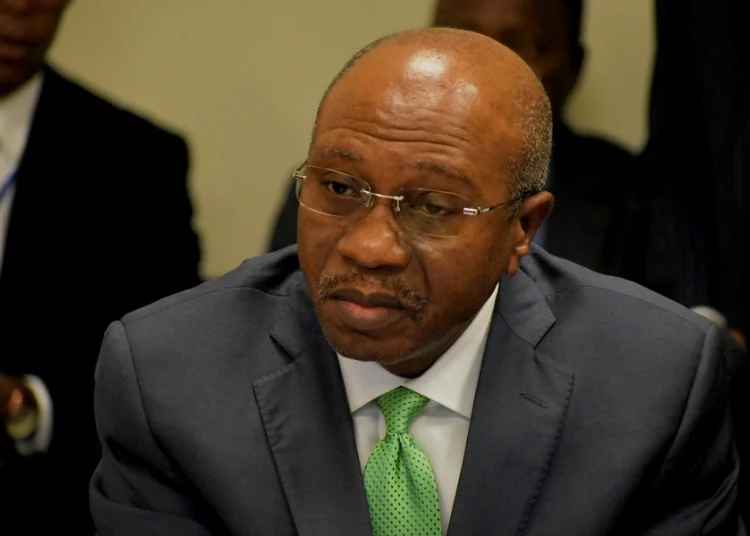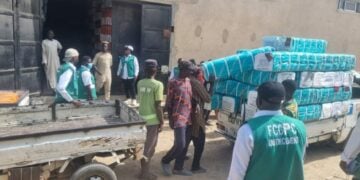With Nigeria’s inflation rate at 19.6 per cent, the highest in 17 years, analysts are warning that the worse may not be over, particularly if the have Central Bank of Nigeria (CBN) does not curtail its lending to the federal government through ways and means to curb the rising cost of living.
This is as available data indicates that the CBN has extended a total sum of N19.9 trillion (N20 trillion) in loans to the federal government under its Ways and Means provision as included in the CBN Act.
Economists are however divided over the limits of the central bank in advancing loans to the government and embarking on intervention programmes in different sectors of the economy.
There are also serious concerns in financial circles that any major shock to the economy, like election spending, agitations by various unions and the removal of the subsidy on Petroleum Motor Spirit, could trigger uncontrollable levels of inflation, eroding the purchasing of millions of Nigerians or even the collapse of the Naira.
Some economists have questioned why the bank continues to lend to the federal government in contravention of Section 38 subsection 2 of the CBN Act which limits advances to the government to 5% of the previous year’s revenue.
Other economists believe the blame for the uncontrollable inflation lies strictly in the hands of the federal government, which has failed to provide security in critical regions affecting not only production the agricultural, manufacturing and oil sectors.
Available data indicates that President Muhammadu Buhari’s administration has relied heavily on Ways and Means as a source of financing its budget deficits.
LEADERSHIP Sunday’s findings reveal that the federal government’s borrowing through ways and means has increased by a whopping 2969.75 per cent in the last seven years of this administration.
Total government borrowing from the CBN which stood at N648.26 billion as at June 2015 when the government got into power has jumped to N19.91 trillion as at June 2022.
This trend, analysts have said, does not bode well for Nigeria, with its low productivity base and heavy dependence on imported finished products.
Inflation: CBN Returns Interest On Intervention Programmes To 9%
According to analysts, simply increasing money in circulation without a commensurate increase in economic output results in doubling money supply without increasing output, leading to a doubling in prices and a doubling in inflation rate.
The Ways and Means provision allows the government to borrow from the Apex Bank if it needs short-term or emergency finance to fund delayed government expected cash receipts of fiscal deficits.
However, since the government started experiencing a significant shortfall in revenue, it has relied heavily on the central bank to finance its expenditure programs via Ways and Means.
A breakdown of the data shows that from N648.26 billion as at June 2015 the federal government’s borrowing escalated rapidly to N2.23 trillion in December 2016 and then to N3.31 trillion in 2017 and N5.41 trillion in 2018.
By the end of 2019, it had grown to N8.72 trillion and an additional borrowing of N4.8 trillion brought the figure to N13.11 trillion at the end of 2020.
In the last two years however, the figure has risen further by almost N7 trillion to N19.91 trillion as at June 2022.
Nigerian governors, in a meeting with President Muhammadu Buhari in July, raised concern over this, saying trillions of naira chasing a few billion dollars would put pressure on the foreign reserves and the exchange rate.
Executive chairman of the Society of Analytical Economics, Nigeria, Prof. Godwin Owoh who has been warning about the various CBN intervention programmes for 10 years now says the Bank has effectively moved from a monetary institution and being a regulator to a fiscal operator.
Prof Owoh said Section 38, subsection 2 of the CBN Act restricts the advance the Bank can grant the government to 5% of the previous year’s revenue and must be outstanding beyond six months. The CBN, he said must not grant anymore advance if it goes beyond six months.
He also said the advance can only be made for financing a budget deficit, insisting the intervention programmes are alien to any law and the CBN Act. Owoh said spending out of appropriation is opaque and leads to loss of control and is the grand reason the country is facing an inflationary trend.
Also commenting on this, renowned economist and former director general of the West African Institute of Financial and Economic Management, Prof. Akpan Ekpo, said the CBN has to unify multiple exchange rates that have impacted the cost of doing business in the import-dependent country.
“The CBN has to restrict the ways and means advances,” Ekpo said.
Besides government’s heavy dependence on ways and means, experts also say that the high inflation is being propelled by an all-time high in the price of diesel, widespread insecurity and a foreign exchange crisis in the country.
Analysts who spoke to LEADERSHIP Sunday on the issue said the fiscal authority should be blamed for the rising inflation rate. Asked why, they quickly point to failure of the federal government to decisively deal with insecurity that has overwhelmed the entire nation, a factor that has almost brought the entire nation on its knees.
Nigeria’s insecurity has seriously affected productive activities in the country. Only very little farming activities is currently taking place in Nigeria. Terrorism, kidnapping and banditry have triggered general cost of living in Nigeria.
Some experts who also spoke with our correspondent say the nation’s scandalous subsidy regime, high import dependence and 2023 election spendings are also responsible for the rise in headline inflation.
Many economic experts said the CBN is not to blame for the rising inflation rate. The experts say the monetary authorities have done more than is expected of them. Economic diversification, local manufacturing, favourable policies, infrastructure and security are major instruments to reducing inflation and addressing exchange rate issues in the nation.
As it stands, beyond the economic shocks that was orchestrated by the Russian/Ukraine crisis, Nigeria’s biggest challenge is the high level of insecurity across the country. The rising inflationary figure is due to the harsh combination of persisting supply chain disruptions and pent-up demand.
The CBN has over the years engaged in sustained intervention programmes that expected to make inflation abate as food supply improves and the fiscal authority sustain its efforts to tame the legacy structural challenges which put upward pressure on domestic price levels.
Economic experts have urged the fiscal authorities to expand and sustain its support for all the recently deployed stimuli to the real sector of the economy.
An economic analyst, Stephen Kanabe who belongs to the league of those who said the causes of the inflation pressures do not have direct bearing on the CBN, point to the fact that the considerable rise in core inflation resulted largely from the rising cost of production due to high energy prices associated with the persistent disruptions to power supply, hike in electricity tariff, continued scarcity of Premium Motor Spirit (PMS), and rising price of Automotive Gas Oil (AGO).
“CBN does not have regulatory or operational role to influence activities in those areas. Then, how do you blame it for what happens in those areas, which are not responsible for the hike in inflation. CBN’s role is to act based on market realities. And the reality now is that inflation is high, the CBN has to tighten to control money in circulation,” he stated.
“The CBN is not to blame,” says an investment consultant Shuaib Kabiru who agreed with the earlier warning by the International Monetary Fund (IMF) which said the 3.4 per cent real Gross Domestic Growth outlook for Nigeria is now being challenged by factors capable of undermining the growth projection.
He noted that the CBN has released intervention programmes targeted at stimulating productivity in agriculture, manufacturing/industries, energy/infrastructure, healthcare, exports and micro, small & medium enterprises (MSMEs).
The CBN, through its several intervention funds, had pumped N4.47 trillion into the Nigerian economy.
Between May and June 2022, under the Anchor Borrowers’ Programme (ABP), the Bank released the sum of N3.62 billion, as disbursements to 12 projects for the cultivation of rice, wheat, and maize, bringing the cumulative disbursement under the programme to N1.01 trillion, to over 4.21 million smallholder farmers cultivating 21 commodities across the country. The Bank also disbursed N3.72 billion to finance three large-scale agricultural projects under the Commercial Agriculture Credit Scheme (CACS). These disbursements brought the cumulative disbursements under this scheme to N744.32 billion for 678 projects in agro-production and agro-processing.
As part of its effort to support the manufacturing sector, the CBN disbursed the sum of N113.08 billion to 19 new projects under the Real Sector Facility. The funds were utilized for both greenfield and brownfield projects under the COVID-19 Intervention for the Manufacturing Sector (CIMS) and the Real Sector Support Facility from Differentiated Cash Reserve Requirement (RSSF-DCRR). Cumulative disbursements under the Real Sector Facility currently stands at N2.183 trillion for the financing of 414 real sector projects across the country.
Under the 100 for 100 Policy on Production and Productivity, the Bank has released N9.98 billion for five projects, bringing the cumulative disbursements under the intervention to N68.13 billion for 48 projects, comprising 26 in manufacturing, 17 in agriculture, three in healthcare and two in the services sector.
In the healthcare sector, the Bank disbursed N4.44 billion to three healthcare projects under the Healthcare Sector Intervention Facility (HSIF), bringing the cumulative disbursements to N133.42 billion for 129 projects, comprising 76 hospitals, 32 pharmaceuticals and 21 other healthcare services.
To further expand the nation’s non-oil export basket under the Export Facilitation Initiative (EFI), the Bank released the sum of N36.00 billion for five projects in domestic production and value addition of cocoa and sesame seeds towards improving non-oil foreign currency revenue.
To improve electricity supply in order to lower the overall cost of production in the real sector, the Bank also intervened in the power sector to facilitate the deployment of enabling infrastructure. Summarily, the sum of N2.53 billion was disbursed to Distribution Companies (DisCos) for their Operational Expenditure (OpEx) and Capital Expenditure (CapEx), under the Nigeria Electricity Market Stabilization Facility – Phase 2 (NEMSF-2).
Cumulative disbursement under the NEMSF-2 currently stands at N254.46 billion. Under the National Mass Metering Programme (NMMP), the Bank disbursed N47.82 billion for the procurement and installation of 865,956 meters across the country.
In effect, currency in circulation which is the physical cash in the hands of the general public and in the vaults of the Deposit Money Banks, as at end of June this year stood at N3.26 trillion as against N1.56 trillion which it was as at June 2015.
The June 2022 figure however shows a N72.5 billion decline compared to N3.33 trillion that was recorded as at the end of May 2022. At the end of last year, currency in circulation stood at N3.32 trillion.
The question economists have been asking is whether the CBN is pouring money into unproductive sectors leading to inflationary trends.
Lecturer in Economics Department at the University of Lagos Babatunde Adeoye said Nigeria needs to take steps to make the country productive in manufacturing and make the environment conducive for foreign direct invest. His argues that Nigeria must be safe to get the desired investors to come and invest in Nigeria. “You do not expect an investor to take his portfolio of resources to a country that is not safe. These are some of the key fundamentals we need to fix,” Adeoye said at the first biennial international 2-day conference in Lagos.
Latest data by the NBS showed that Inflation for July 2022 rose to 19.65 per cent, the highest level of fast rising prices of goods and services the country has witnessed since September 2005 when it was 24.31 per cent. Inflation has stubbornly remained above the Central Bank of Nigeria single digit band since 2016.
As against the normal drivers of inflation such as too much money in circulation, planting season or increases in petrol prices, some analysts say the current drivers of inflation have been widespread insecurity in the country which is fuelling food shortages across board as well as the increased taxations.
Asides these, they also pointed out the high cost of diesel which is a basic component of production for most consumer goods manufacturers as well as corporate organisations. The price of diesel which fuels the economy in the absence of stable electricity supply has risen from N250 per litre in the beginning of this year to N800 per litre.
The scarcity of foreign exchange which has seen the value of the naira plummet, thus impacting prices of imported goods in the country was also fingered as a major driver of inflation in the country. The value of the naira has since depreciated to over N700 to the dollar at the parallel market as scarcity continues at the official window.
These, alongside the impact of the Russian war against Ukraine and the lingering impact of the COVID-19 pandemic on the global economy which has spurred inflation across nations. The International Monetary Fund had said global inflation is expected to peak in the second quarter of 2022 but expected to begin to moderate before the end of the year.
Commenting on the latest inflation figures, Chief Executive of Centre for the Promotion of Private Enterprise (CPPE) and former Director General of the Lagos Chamber of Commerce and Industry (LCCI), Dr Muda Yusuf said the heightened inflationary pressure in the Nigerian economy remains very troubling.
“The major inflation drivers have not abated, if anything, they have become even more intense. These factors include transportation costs, logistics challenges, exchange rate depreciation, forex liquidity issues, hike in energy prices, climate change, insecurity in many farming communities and structural bottlenecks to production. These are basically supply side issues. Any mitigation measures would have to be situated in the context of these factors.
“The accelerated fiscal deficit financing by the CBN is a significant inflation driver. The financing of fiscal deficit has been elevated to disturbing levels with huge implications for money supply and consequent effect on inflation. CBN financing of deficit is high powered money and very inflationary. It is inflation tax.”
As at July this year, the CBN through its several intervention funds had pumped N4.47 trillion into the Nigerian economy. This is aside its finances to the federal government through ways and means.
To curb the rising inflation, the CBN had taken an hawkish stance at the last two monetary policy meetings held this year but analysts say this is not enough to curb the spiralling rise in prices of goods and services in the country.
Head, Financial Institutions Ratings at Agusto& Co, Ayokunle Olubunmi, explained that monetary policies alone can not address the current inflation which is mainly driven by supply side. Olubunmi, who pointed out that inflationary pressures from electioneering activities is yet to be reflected noted that “the external impact with the challenges in the economy is significantly affecting businesses and unfortunately, it is going to be very difficult to tame this kind of inflation because it is not demand pull.
“It is from the supply side assuming it is demand pull then you can use various monetary policies to be able to control it. However for this it has to be the fiscal authorities that has to do something and to now make things worse most of the factors causing the inflation are external induced. Look at the exchange rate.
Analysts at Agusto&Co had noted that for Nigeria, deep-seated structural deficiencies, which have heightened the country’s susceptibility to external shocks, have become even more apparent. Despite a strong recovery in the non-oil sectors, GDP growth slowed in H1’22 to 3.28 per cent from 4.01 per cent in H2’21, but the overarching development was the ripple effect of the Russia-Ukraine conflict, which manifested primarily in the form of a surge in headline inflation.
The global wheat price surge is being exacerbated by the exchange rate pass-through effect, which is driving food inflation. Meanwhile, the surge in diesel prices, has given Nigerians a glimpse of the realities of a deregulated petrol market and is contributing significantly to higher production and logistics costs which are driving inflation.
Yusuf had pointed out that “Mounting inflationary pressures weakens purchasing power of citizens as real incomes are eroded, it aggravates pressure on production costs, negatively impacts profitability. This erodes shareholders value and undermines investors’ confidence.





